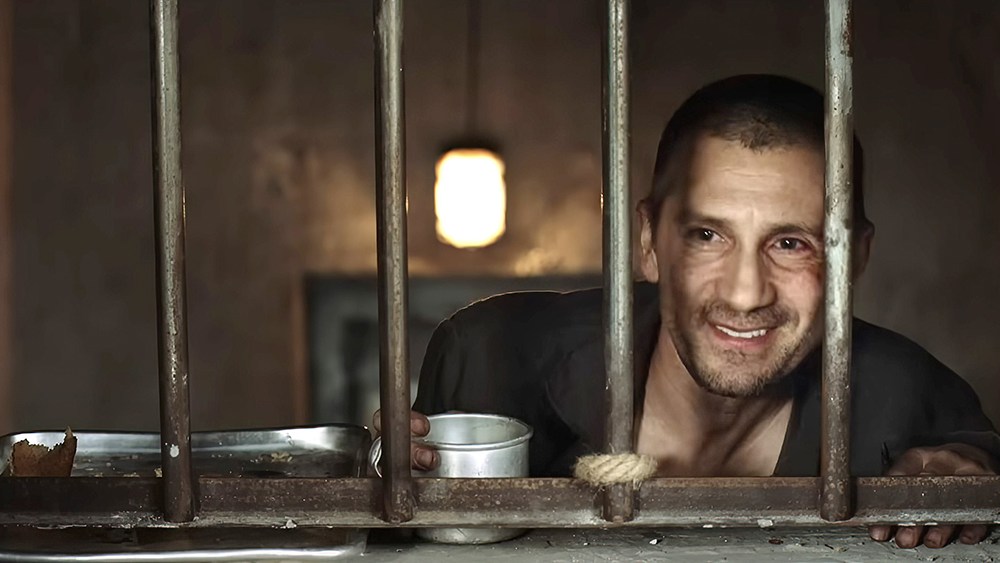‘Amerikatsi’ Review: A Soulful Armenian Comedy-Drama
Three decades after the 1915 Armenian Genocide, an optimistic American Armenian returns to his Sovietized homeland, only be thrown in prison under flimsy circumstances. From his squalid jail cell, he peers daily into the home and inner life of one of his Armenian prison guards, and inadvertently finds the cultural connection he’d been searching for. This broad premise informs the sentimental comedy-drama of “Amerikatsi” (or “The American”), Armenia’s shortlisted international Oscar submission. Written and directed by Michael A. Goorjian, who also stars in the leading role, it’s a moving work about diasporic yearning, coming to us as history repeats itself, after more than 100,000 ethnic Armenians were forced to flee Nagorno-Karabakh earlier this year.
The movie’s dreamlike prologue follows a young Armenian boy escaping the brutality of the Ottoman Army during World War I, peering out of a tiny hole in an ornate luggage trunk. The interior of this box is embossed with the serene image of Mount Ararat which, while located in modern Turkey, holds deep significance as a national symbol for the Armenian people. Decades later, this boy — now a middle-aged Poughkeepsie local, “Charlie” Bakhchinyan (Goorjian) — takes advantage of Joseph Stalin’s program to repatriate displaced Armenians, but stumbles headfirst into a Soviet family comedy of sorts, though he’s none the wiser.
After assisting the disgruntled Armenian wife of a high-ranking Soviet official, brewing jealousies and crossed wires lead to Charlie — who’s fluent in English, speaks scattered Armenian and knows not a lick of Russian — being locked up for the crime of wearing a polka dotted tie. Before long, his daily routine involves stale bread, hard labor and propping himself up at his window to gaze into the small but humble home of one of his prison guards, echoing his defining childhood event, as though he were doomed to live life at a remove and view it through a pinhole. However, what begins as mere entertainment for Charlie eventually blossoms into a portrait of cultural isolation, as he slowly picks up on bits of Armenian culture and customs from afar.
As Charlie (who the prison guards nickname “Charlie Chaplin”), Goorjian brings a robust comedic energy to the screen. He would feel at home in a film by Jacques Tati as he creates humor through his physicality, warping the fabric of any scene the moment he steps into a room. His animated performance goes hand-in-hand with his initial conception of Charlie as a stereotype of an American visiting another country, drawing attention through his loud brashness and his ignorance of local customs. In fact, Goorjian — an American of Armenian descent — uses this preconception of Americanness to create a hapless, helpless protagonist whose unbridled optimism seems naive, before he unwraps the character layer by layer, revealing him to be defiantly hopeful in spite of adversity. Though comical at the outset, his performance ends up soulful and devastating. When Charlie grows thinner and more gaunt, an unspoken element of the drama is whether or not he’ll be able to hold on to the glimmer of light in his eyes.
Goorjian gives that light physical form through his filmmaking. His story is born through the back-and-forth cutting between Goorjian’s own subtle, distinctly “cinematic” performance — in which his eyes reflect comfy living-room lights in the distance — and the stage-like gesticulations of Hovik Keuchkerian and Narine Girgoryan, who play the bickering Armenian couple whose daily life becomes Charlie’s soap opera. The very act of looking becomes enrapturing, as though “Amerikatsi” were a film about the magic of movies (à la “Cinema Paradiso”) but with the projector and the silver screen stripped away.
Eventually, the two opposing modes of visual storytelling at its core (one distinctly intimate, the other distant and observational) come into explosive contact like matter and antimatter, as the idea of art metaphorically gazing back at its viewer takes distinctly literal form. It’s a moment that not only twists the screws of Goorjian’s zany plot, but feels like lightning as it unfolds, a tonal oscillation mirrored by composer Andranik Berberyan’s constant use of both upbeat comedic jazz and wistful Armenian folk.
If there’s criticism to be lobbied at Amerikatsi it’s that it remains mostly unconcerned with the brutality wrought upon Charlie and his fellow prisoners, or with the psychology of its numerous Armenian guards who oppress their kinsmen at the state’s behest. Instead, it remains tethered to Charlie’s perspective (often to a fault). And while holding back on these more rigorous explorations allows it to blossom as a “feel-good” film about atrocity (in the vein Roberto Benigni’s “Life is Beautiful”), Goorjian also employs a mischievous sleight of hand when it comes to these ideas. They remain mere implications in the movie’s margins for the most part, but he causes them to come crashing down all at once, in a brief but powerful moment late into the runtime.
What might seem mawkish on paper ends up deeply affecting in practice. Like British playwright Tom Stoppard, whose recent production “Leopoldstadt” masterfully explored his connection to his Jewish-Austrian roots — and his separation from them after the Holocaust — Goorjian reaches deep into Armenian cultural memory and searches for his place within it, as an artist adrift from his family’s culture and homeland, forced to peer at it and learn about it from a distance. He even dedicates the film to his grandfather, a survivor of the 1915 genocide, thus framing the story as an intimate fantasy of reclaiming the parts of himself which were ripped from his hands long before he was born. In the few moments his history and culture finally feel within reach, “Amerikatsi” overflows with nostalgia and unabashed tenderness. A balm for even the most hardened souls.

